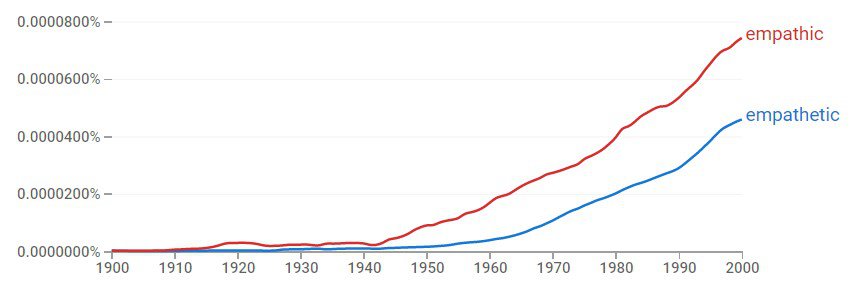Empathic is usually just a variant of empathetic, which means characterized by empathy. Some dictionaries, especially American ones, list empathic as the standard word and empathetic as the variant, but while the shorter word is indeed the original, empathetic has prevailed—probably due to analogy with sympathetic, with which it is often closely associated—and is now about five times as common as empathic in newswriting, blogs, and mainstream books from throughout the English-speaking world.
There are qualifications to this, though. While empathetic has prevailed in popular usage, the older, shorter form is still preferred in scientific writing, including writing on psychology, where the word has a breadth of meaning not fully captured in popular usage. Empathic is also favored in certain types of nonscientific writing, including modern spiritual writing and self-help writing. All these factors likely explain why the below ngram, which graphs occurrence of the two forms in a large number of 20th-century English-language books and periodicals, shows empathic to be more common despite empathetic being clearly preferred in most contexts:
Meanwhile, empathic has developed the latter-day sense very in tune with the thoughts and feelings of others, which it does not share with empathetic. This sense is mostly confined to pseudoscientific writing about supposed psychic powers.
Examples
Empathetic is the form typically found in news publications, blogs, and other mainstream sources—for example:
His adversary, the Lorient coach Christian Gourcuff, tried to sound empathetic but probably made things worse. [New York Times]
When he talks about figit pie or bara brith it’s a stern reader that doesn’t find herself overtaken by a bout of empathetic dribbling. [Guardian]
Gran, the tough-but-fair warden in a juvenile detention centre, was one of Lilley’s finest and most empathetic creations. [Sydney Morning Herald]
Now, in a case like that, and in yours, one can’t help but feel empathetic, even a little impressed. [Globe and Mail]
Empathic, meanwhile, is commonly found in writing on science and psychology as well as in spiritual and self-help writing:
Empathic responding, most notably perspective-taking and empathic concern, has important implications for interpersonal functioning. [Journal of Marital and Family Therapy]
Few of us routinely practice empathic listening, the most advanced form of listening. [Stress Management for Life]
It must be explained, nonetheless, that natural healing relies basically on an empathic transfer of energy through healing hands or focused thought forms. [Natural Pet Healing]


Comments are closed.